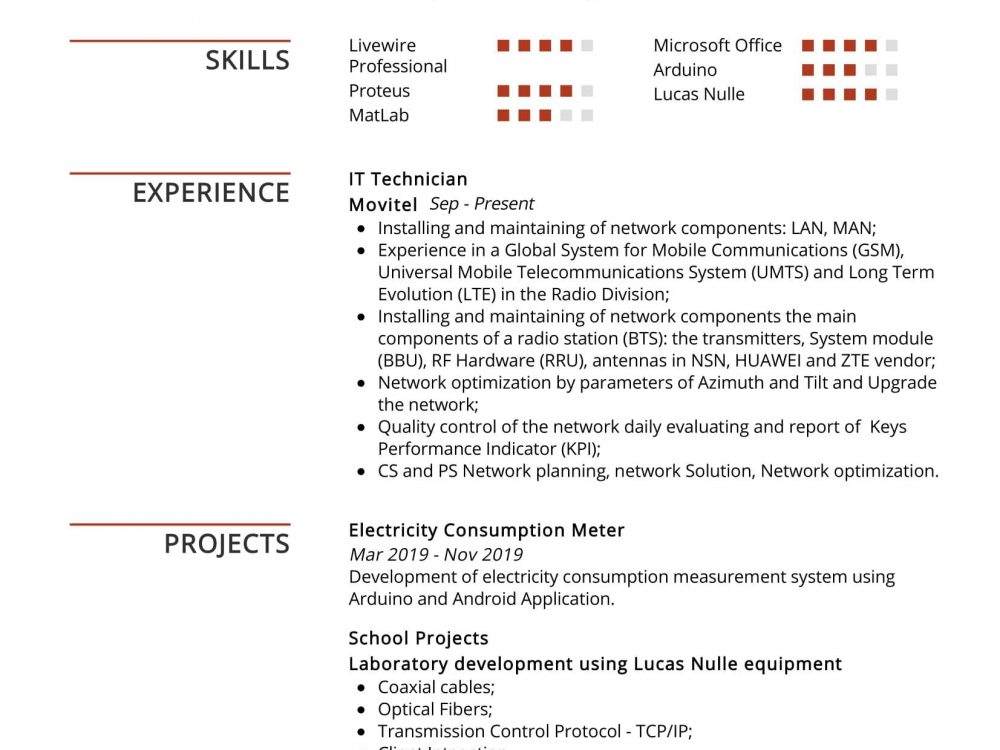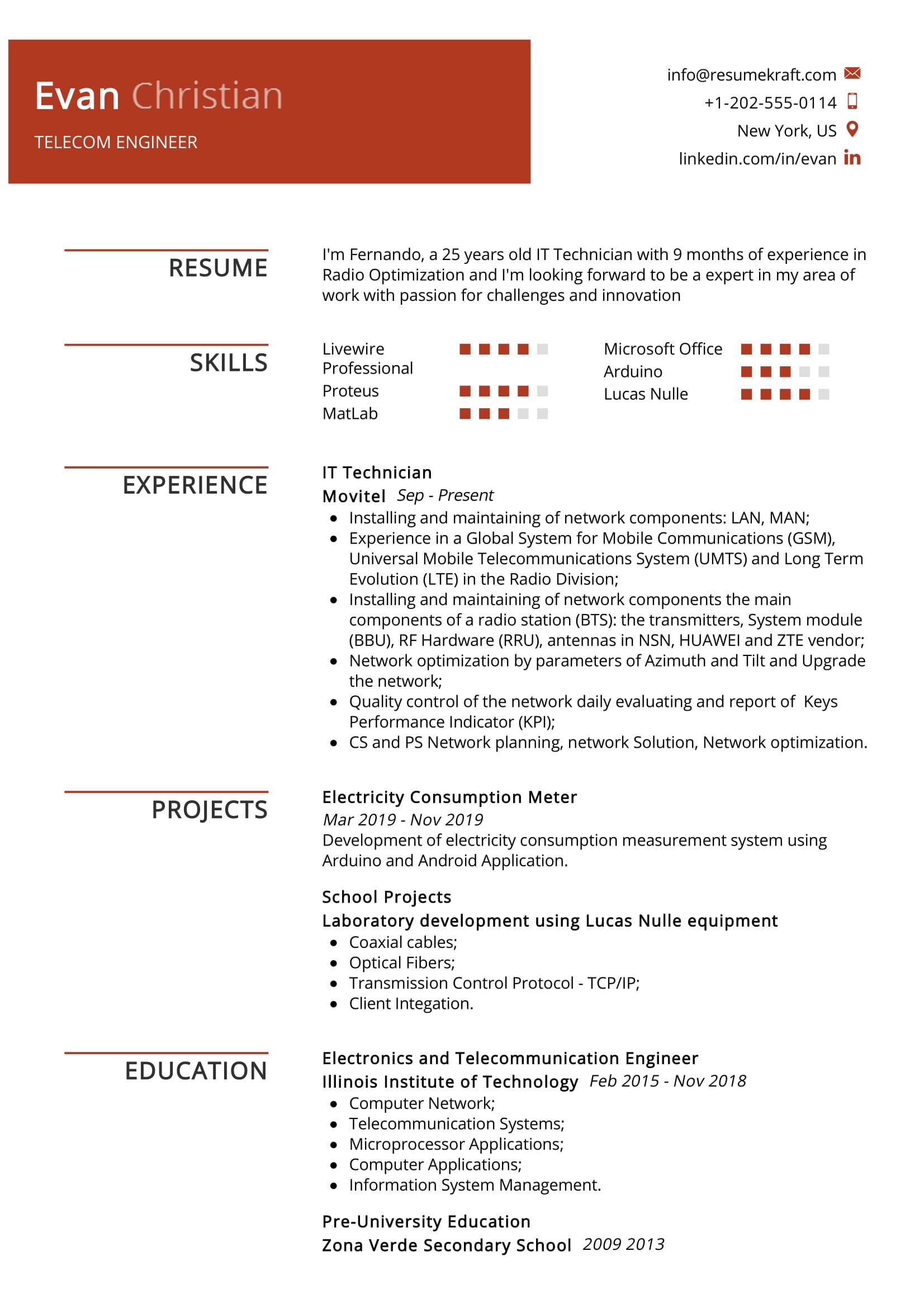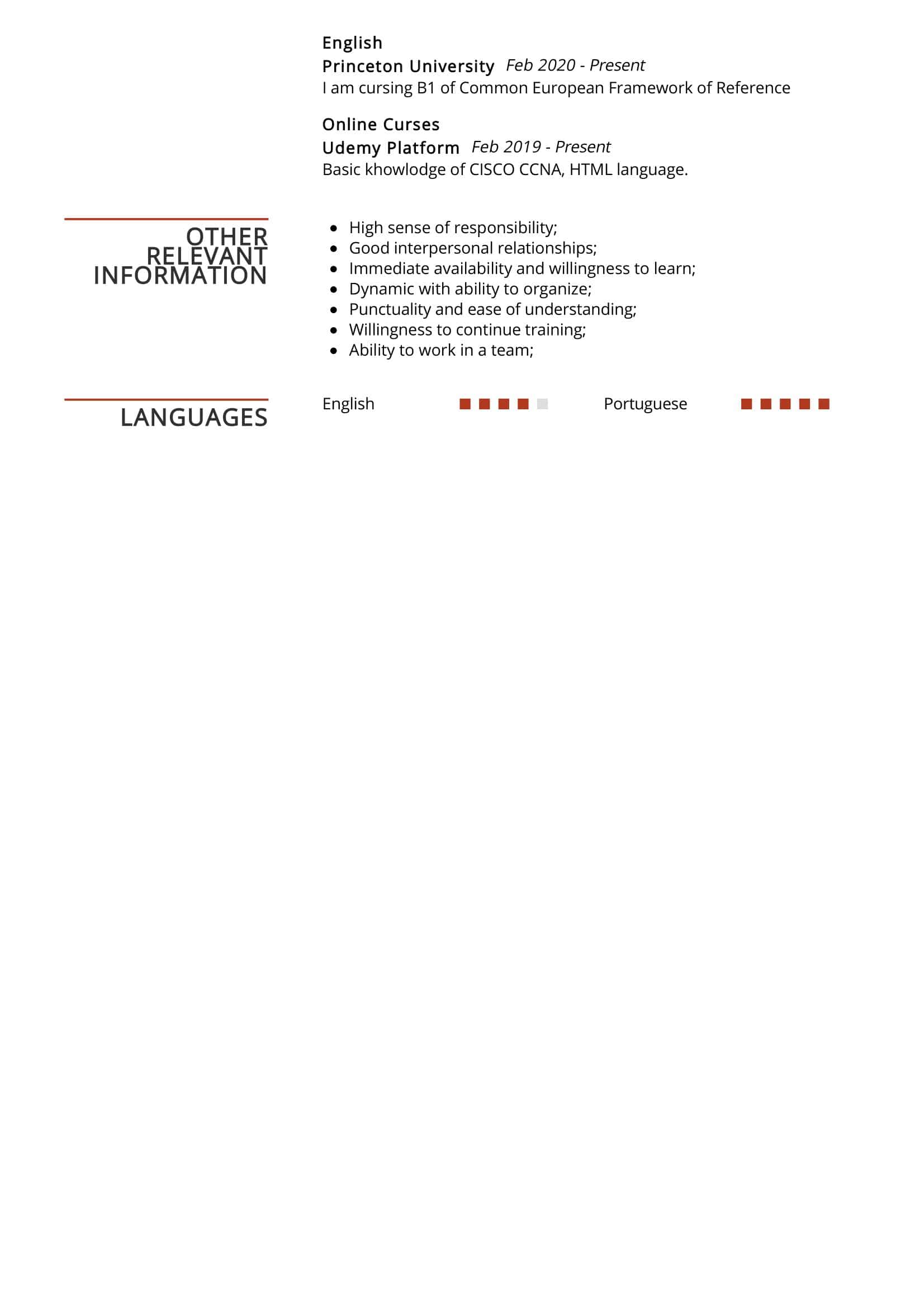Are you a Telecom Engineer by profession and looking for an exciting career? We have good news for you! use our professional Telecom Engineer Resume Sample. You don’t have to start writing from scratch. Just click “Edit Resume” and modify it with your details. Update the template fonts and colors have the best chance of landing your dream job. Find more resume samples.
Telecom Engineer Resume Sample
Evan Christian
Telecom Engineer
Summary
I’m Fernando, a 25 years old IT Technician with 9 months of experience in Radio Optimization and I’m looking forward to being a expert in my area of work with a passion for challenges and innovation
Skills
Work Experience
IT Technician
Movitel
- Installing and maintaining of network components: LAN, MAN;
- Experience in a Global System for Mobile Communications (GSM), Universal Mobile Telecommunications System (UMTS) and Long Term Evolution (LTE) in the Radio Division;
- Installing and maintaining of network components the main components of a radio station (BTS): the transmitters, System module (BBU), RF Hardware (RRU), antennas in NSN, HUAWEI and ZTE vendor;
- Network optimization by parameters of Azimuth and Tilt and Upgrade the network;
- Quality control of the network daily evaluating and report of Keys Performance Indicator (KPI);
- CS and PS Network planning, network Solution, Network optimization.
Projects
Electricity Consumption Meter
Development of electricity consumption measurement system using Arduino and Android Application.
School Projects
Laboratory development using Lucas Nulle equipment
- Coaxial cables;
- Optical Fibers;
- Transmission Control Protocol – TCP/IP;
- Client Integration.
Education
Electronics and Telecommunication Engineer
Illinois Institute of Technology
- Computer Network;
- Telecommunication Systems;
- Microprocessor Applications;
- Computer Applications;
- Information System Management.
Pre-University Education
Zona Verde Secondary School
I am cursing B1 of Common European Framework of Reference
English
Princeton University
I am cursing B1 of Common European Framework of Reference
Online Courses
Udemy Platform
Basic knowledge of CISCO CCNA, HTML language.
Languages
- French
- English
- German
- Chines
Career Expert Tips:
- Always make sure you choose the perfect resume format to suit your professional experience.
- Ensure that you know how to write a resume in a way that highlights your competencies.
- Check the expert curated popular good CV and resume examples
Telecom Engineer Resume with Writing Guide
If you are a telecom engineer, or you want to become a telecom engineer, you need to know how to make your resume stand out. In this article, we have included a guide on how to customize your resume and tips from industry professionals for help with resumes and cover letters tailored just for you!.
Do not let your resume go unnoticed! Follow these guidelines and make sure it makes the perfect first impression.
Before you start writing your resume, you need to decide what information to put into it. What are you going to include in your “Bio” section? Include information that will give the employer a solid picture of your experience and skills. Also make sure to include any certifications or awards that you may have received for doing a great job.
Telecom Engineer Resume Writing Guide:
1. Name and Contact Details:
When you are a telecom engineer, your contact information should be included on the top of your resume. You should have a professional email address and personal phone number. Your company’s name and title should also be listed in the header section or at the top of the resume. Most companies now require that you provide a phone number, so it would be best to have this on your contact details section as well.
2. Objective:
Some people disagree with having an objective section on your resume. It is up to you to decide if this kind of information is essential for you. However, it is a good idea to have an objective if the position you are looking for has several different responsibilities or duties that will be included depending on your level of experience in the industry.
3. Work Experience:
In your work experience section, you should include the information of past jobs that you have held, starting with the most recent. Start off by writing your job title, company name, dates worked for the company and if it was full-time or part-time work. You should also include a brief description of your achievements in each of the positions that you have held in the past.
4. Education:
List your university courses and when you graduated, what kind of degree you received. Include the dates that you received your degrees. Make sure to write down dates if the degree was completed in more than one term.
5. Personal Information:
In the personal information section, include a brief description of your hobbies and interests as well as information about your family. You should also write down your favourite sports, personal accomplishments, your relationship status and any other information that you think employers need to know.
All of the information that you have written down so far should go on your resume in order from most recent to least recent. Start with the most recent position and move backwards in time.
6. Professional Experience:
If you are a telecom engineer, the professional experience section will be similar to what you would include in a work experience section if this is not part of your job description.
Telecom Engineer Responsibilities:
- To ensure that the Telecom Network is efficient, and meets the current and future requirements of the client.
- To provide technical support to operators / staff at various levels by developing.
- Ensuring that the network is properly maintained.
- To assess new developments and come up with new ideas to enhance overall performance of the operation.
- Work in a team to ensure that all aspects of network operation are covered, including equipment maintenance, security, call handling, etc.
- To identify problem areas in the network and propose solutions.
- To monitor, and resolve any problems in the network smoothly.
- To conduct studies on existing Telecom Network and ensure that it is working efficiently.
- To assist in all Network operations.
- Collaborate with IT and Security departments to ensure that the network is secure and hacker free.
- Foster internal communication to ensure that each department has a mutual understanding of issues and issues are resolved smoothly.
- To provide information about the Network to clients, i.e. client’s telephone requirements, voice quality requirements, voice data requirements, etc.
Top 10 Must-have Telecom Engineer Skills:
- Internetworking
- Communications
- Router configuration
- Wireless network installation and troubleshooting
- FTTx installation and troubleshooting
- Network Security
- Forensics
- Computer Operations
- Wireless LAN installation and troubleshooting
- WAN Network Operation
- Internetworking: Telecom engineers are trained to implement, support and maintain the Internet within various organizations, businesses, government agencies, and universities worldwide. They provide each organization with access to the Internet as well as protocols that enable them to build their own internal network(s). Technically oriented individuals from diverse backgrounds with a solid understanding of networking principles are preferred for these positions.
- Communications: Telecom engineers typically plan, implement and support voice, video and data communications systems. As technology evolves, they may be involved in providing access to wireless networks, wired broadband connections and a variety of different link types. Their duties can range from engineering support for high-capacity cable or fiber-optic systems to managing a variety of wireless communications technologies including Wi-Fi, DECT, Bluetooth, RFID and other local area network technologies.
- Router configuration: Telecomm engineers set up and maintain the various routers used throughout an organization. They are responsible for monitoring, configuring, and troubleshooting the network in order to ensure that it is functioning at optimal levels. As networks become more complex, telecom engineers must be well-versed in a variety of routing protocols (e.g., OSPF).
- Wireless network installation and troubleshooting: Telecom engineers are responsible for installing and maintaining WLAN access points, including designing and implementing the network. Their work may involve configuring an enterprise wireless system as well as functional testing the equipment.
- FTTx installation and troubleshooting: FTTx (Fiber To The Home) is an extension of DSL or cable service that provides high-speed Internet connections to homes in rural areas where it would be difficult or impractical to lay a physical network cable. Telecom engineers are involved in the installation, maintenance and troubleshooting of these systems.
- Network Security: Telecom engineers are often responsible for designing and implementing network security measures. They may play a role in software development as well as providing security policies and configurations for servers, routers and switches within an organization’s network. Telecomm engineers should have strong knowledge of current security issues and concerns such as hacking, viruses and worms, spam, etc.
- Forensics: A telecom engineer with a strong grasp of network protocols and programming will be able to use forensic tools and procedures to help a company resolve security issues ranging from unauthorized access to data breaches.
- Computer Operations: The Internet and networking technologies have advanced so much over the years that telecom engineers must be computer literate and tech-savvy in order to keep up. They need a strong background in Windows, Linux, Unix/Linux shell scripting, programming (C or C++), databases (MySQL), and network switching devices.
- Wireless LAN installation and troubleshooting: Telecom engineers are the individuals responsible for implementing, supporting and maintaining WLAN (Wireless Local Area Network) systems within a company. They may plan, design and implement wireless networks in support of the organization’s business goals. Troubleshooting these systems typically involves working with: network administrators and other technical support personnel, telecom vendors and the IT staff to resolve technology problems. Working as a team member will allow an individual to obtain further training to develop work skills that could be helpful in other careers.
- WAN Network Operation: The WAN (Wide Area Network) is a network extending across a network domain that connects multiple geographic sites and organizations. Although this is typically associated with large corporations that have multiple geographically located offices, such as television stations, telecom engineers need to be proficient in networks and technologies that are used to connect two or more sites together via leased lines or cable connections.
Tips to write a Telecom Engineer Resume Summary:
- Include a summary of your professional, technical, and business skills. The summary or overview is not a section you want to be elaborate on. All you need to do is provide an overall view of your qualifications in a few clear sentences.
- Include key phrases for resume software to read, which will help your resume stick out from the rest: “Management experience”
- Address all of the job requirements in the outside summary statements
- Mention organizational achievements that are relevant to this job
- Include references.
How to write a Telecom Engineer Resume with No experience:
- Include keywords in your resume titles
- Include keywords in job titles
- Include keywords in company names and contact names
- Use “By” instead of “Development” if your major is not listed as a specialty
- Write out your job title, e.g. “Network Engineer”
- Write out your job title, e.g. “Telecommunications Engineer”
- Use particularity where it makes sense, e.g. “Telecommunications Engineer with specialization in Telecommunications Switching and Networking”
- Avoid capital letters as they are used only for emphasis, especially in job titles
- Capitalize the first letter of each word after a colon or semicolon
How to write a Telecom Engineer Cover Letter:
- The first thing you should do is introduce yourself. The first sentence should be your name and a short description of your skills and experience. For instance, “Hello! My name is John Smith. I am currently a telecom engineer with three years of professional experience. I have excellent verbal communication skills.”
- The second paragraph is where you can elaborate on your job responsibilities and highlight specific technical skills that can be applied to the position. For instance, ” During my last three years of experience, I have taken on the role of a test engineer responsible for ensuring that network devices function properly in a range of deployment scenarios.”
- The third paragraph should be your resume. You can include some details about yourself and how you would fit into the team. Ensure that you highlight relevant skills and qualifications and avoid lengthy details as they may distract from the main message.
- The last paragraph should be a summarization of what you have learned during your professional career so far.
Key Takeaways:
- Do not place any extraneous information.
- Do not use any unnecessary phrases or acronyms.
- Do not forget to mention your education and experience at the top of the page.
- Consider including a personal profile or statement of work ethic as well as relevant interests, especially if they relate to your career objective or position applied for.
- List software experience, computer skills, and databases knowledge, as well as tech degrees or certifications near the top of the resume to attract employer attention.



